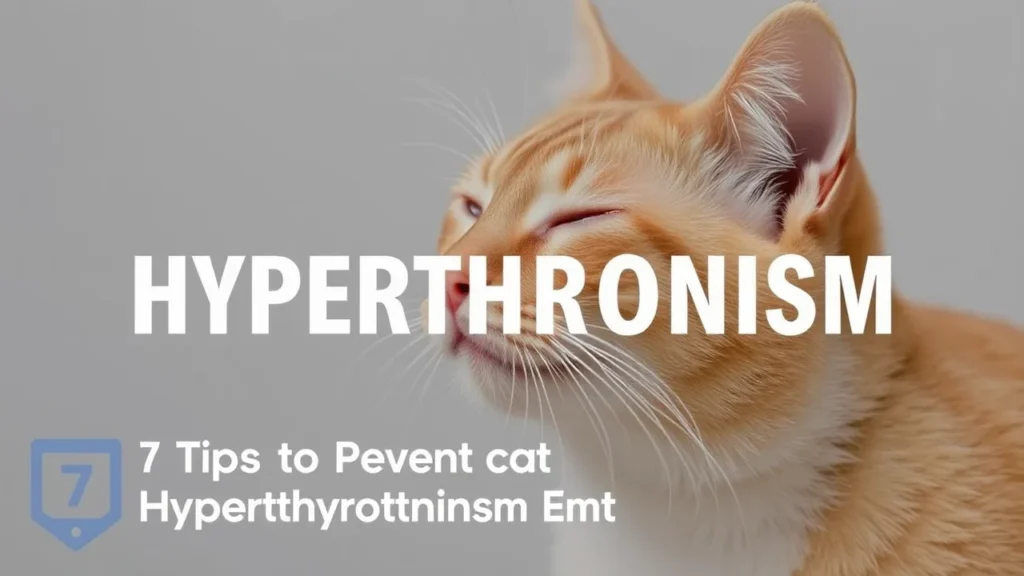Cats are more than just pets; they are family. Watching our furry friends thrive brings us immense joy. However, as they age, we become increasingly aware of various health issues that can arise, one of which is hyperthyroidism. This condition can be overwhelming, but understanding how to prevent and manage it can make a significant difference. In this post, we’ll explore effective tips to prevent cat hyperthyroidism symptoms, ensuring that your feline companion remains healthy and happy.
Main Points of Post
Understanding Hyperthyroidism in Cats
Before diving into prevention tips, it’s essential to understand what hyperthyroidism is. This condition occurs when a cat’s thyroid gland produces too much thyroid hormone, leading to various health issues. While it primarily affects older cats, knowing the early stage hyperthyroidism in cats can help catch it before it becomes serious.
The Importance of Early Detection
Recognizing the signs of hyperthyroidism early is crucial. Common symptoms include increased appetite, weight loss, excessive meowing, and hyperactivity. If you notice any of these cat thyroid symptoms meowing or other unusual behaviors, it’s important to consult your veterinarian. Early detection can make treatment for hyperthyroidism in cats much more effective.
Tips to Prevent Cat Hyperthyroidism Symptoms
Now that we understand hyperthyroidism, let’s explore actionable tips to help prevent its symptoms.
1. Regular Vet Check-Ups
Just like us, our cats need regular health check-ups to catch any issues early on.
Routine vet visits allow for early detection of thyroid issues. During these check-ups, your vet can perform blood tests to monitor thyroid hormone levels. Early stage hyperthyroidism in cats can often be managed effectively if caught in time.
2. Balanced Diet
You are what you eat, and the same goes for your cat!
Providing a balanced diet is one of the best ways to prevent health problems, including hyperthyroidism. Focus on high-quality cat food that meets your cat’s nutritional needs. Look for options with adequate protein, vitamins, and minerals. Avoid feeding your cat too many treats, which can lead to obesity and other health issues.
3. Maintain a Healthy Weight
Just like in humans, weight matters for our furry friends.
Keeping your cat at a healthy weight can help prevent various health conditions, including hyperthyroidism. Obesity can lead to stress on the thyroid gland. Monitor your cat’s weight regularly and consult your vet if you notice any sudden changes.
4. Reduce Stress
Stress is often overlooked but can significantly impact your cat’s health.
Cats can be sensitive to changes in their environment. Try to keep their surroundings calm and stable. Introduce new pets or changes gradually. Providing a safe space for your cat to retreat to can help alleviate stress and prevent health issues.
5. Limit Exposure to Chemicals
The environment plays a crucial role in our pets’ health.
Household chemicals, such as cleaning products and pesticides, can negatively affect your cat’s health. Whenever possible, opt for natural cleaning products and ensure good ventilation. Keeping your home chemical-free can help reduce the risk of hyperthyroidism and other illnesses.
6. Encourage Play and Exercise
A playful cat is a happy cat!
Regular playtime helps keep your cat active and engaged. Physical activity can prevent obesity and maintain a healthy weight, both of which are crucial for thyroid health. Use toys, laser pointers, and interactive games to stimulate your cat mentally and physically.
7. Provide Fresh Water
Hydration is key to overall health!
Ensure your cat always has access to fresh water. Proper hydration helps maintain healthy organ function, including the thyroid gland. Consider using a cat water fountain, as many cats prefer running water.
8. Consider Iodine Levels
Did you know that iodine plays a role in thyroid health?
The thyroid gland needs iodine to produce hormones. However, too much iodine can lead to hyperthyroidism. Be cautious with iodine-rich foods and consult your vet for guidance on proper levels for your cat’s diet.
9. Monitor for Symptoms
Staying vigilant can save your cat’s health.
Regularly observe your cat for any signs of hyperthyroidism. If you notice any cat thyroid symptoms meowing excessively or behaving differently, take action. Early intervention can prevent severe complications.
10. Educate Yourself
Knowledge is power!
Understanding hyperthyroidism and its risk factors can empower you to take preventive measures. Read up on feline health and consult your veterinarian for the latest information on preventing hyperthyroidism in cats.
Treatment for Hyperthyroidism in Cats
If your cat does develop hyperthyroidism, several treatment options are available. Early intervention is vital to manage the condition effectively. Treatment for hyperthyroidism in cats typically includes:
- Medication: Anti-thyroid medications can help manage hormone levels.
- Radioactive Iodine Therapy: This treatment targets the thyroid gland and is highly effective.
- Surgery: In some cases, surgical removal of the thyroid gland may be necessary.
Conclusion
Hyperthyroidism can be a daunting diagnosis, but with the right knowledge and preventive measures, you can help your cat live a long, healthy life. Regular vet visits, a balanced diet, and a stress-free environment are just a few of the proactive steps you can take.
By staying vigilant and informed, you’ll not only enhance your cat’s quality of life but also strengthen the bond you share. Remember, your furry friend depends on you for their health and happiness. Let’s work together to keep them thriving!



